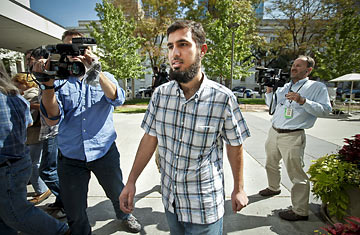
Najibullah Zazi arrives at the Byron G. Rogers Federal Building in Denver
In military and intelligence parlance, it's called a "hot wash" — an instant review of an operation, evaluating what worked, what didn't, and how to make the next one better. With the case against U.S.-based terror suspect Najibullah Zazi now in Federal court, many of the agencies involved in the investigation, from the FBI to the police forces of Denver and New York, are retracing their steps.
"[What] we are doing now is asking ourselves why didn't we know about this earlier," says a senior Administration official. "Could we have known about this earlier? Could we improve our already very strong ability to identify and stop these types of activities early on?"
(Afghanistan-born Zazi has pleaded not guilty to the charge of plotting a terrorist attack; his next court date is Dec 3.)
Simultaneous to the hot washes, investigators are sifting through the evidence gathered to clear up some remaining gray areas in the case.
There are four areas of special interest:
1.The Afghan angle
Since Zazi is the first Afghan national accused of plotting a Qaeda-style international terror attack, many in and outside the intelligence community initially worried that he represented a new kind of threat. Was he motivated by Taliban-style Afghan nationalism, seeking revenge for U.S. actions in his homeland?
Officials now say the Afghan angle may not be especially important. "I think this guy's more a global jihadist than an Afghan nationalist," says an intelligence official who has been briefed on the case.
What motivated him, then? Some officials suggest he may have started down the path to radicalization in Pakistan. A senior Administration official points out that Zazi spent many of his formative years — from ages 7 through 14 — in Peshawar, a city teeming with jihadi groups. "And we know that Pakistan has been a venue for this type of indoctrination, recruitment training in the past," the official adds.
Even so, says Michael Rolince, former head of the FBI's International Terorrism Operations Section, Zazi's nationality may be "one more reason to be very broad-minded in thinking [about] where the next attack comes from."
2. Where the trail began.
There have been conflicting reports about when the authorities began to watch Zazi, and much of the speculation has centered on the trip he and some associates made to Pakistan in the summer of 2008. But it now appears that the Pakistan trip was no more than a blip in the radar. "We had a mild interest in him, but not one that goes back a long way," says the intelligence official briefed on the case. "Anybody who says we were working this guy back in 08 would be exaggerating. We go back a month and some change with him."
What prompted the increased interest? The official explains: "When his communications about chemical mixtures and other things amped up, when his travel took on a sense of urgency, when he got in a car to New York with plans to fly back the obvious questions came up: What does he have in his car that he can't put in an airplane? And, who's waiting on the other end?"
3. Did the New York Police Department screw up?
The surveillance of Zazi was blown when two NYPD detectives showed pictures of him and three others to the imam of a Queens mosque — who then allegedly alerted Zazi. At first, this seemed to have severely complicated the case; the FBI had planned to leave Zazi loose for a while longer, hoping he would lead them to a wider net of conspirators. Some current and former FBI hands blamed the NYPD for botching the investigation, and worried it would weaken the case against Zazi.
With time, a more forgiving view has emerged. Intelligence officials now say the detectives had reason to hope the imam would be able to help them with the investigation, and could not have known that he would call Zazi.
As if to underline the reassessment of the NYPD's role in the Zazi case, President Obama called Police Commissioner Ray Kelly to congratulate the department for its contribution.
More important, officials say, the detectives' decision to confide in the imam did not weaken the case. "Looking back on it, NYPD did not do anything that compromised the ability to actually pull the threads on this," says the senior Administration official. "Sometimes stuff happens and you don't anticipate certain things."
4. The co-conspirators
The indictment against Zazi refers to at least three associated who helped him buy the beauty products from which the bombs were to be made.
Or did he help them?
It's still not absolutely certain Zazi was in charge of the alleged plot. "He wasn't a mastermind as much as he was the driver — someone who wanted to do something, and willing to do the dirty work," says the intelligence official briefed on the case. "He had a very active hand in it."
His relationship with his co-conspirator partners remains a mystery, too. "Even at this point, it's not clear as to the exact nuances of the pecking order," says the official. "That's one of the things we're looking for further granularity on."
